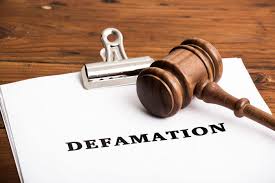DEFAMATION LAW DEFINITION
Defamation law in Pakistan defines defamation as a statement that harms a third party’s reputation, which includes both libel (published statement) and slander (verbal statement). The purpose of defamation is to undermine the plaintiff’s esteem, respect, goodwill, or confidence, or to arouse adverse, derogatory, or unpleasant feelings or opinions against the affected person. For not to bear it in society there is defamation law practice in Pakistan. Contact for online law services in Pakistan

A statement that exposes the speaker to contempt, hatred, ridicule, or obloquy can lead to defamation law practice in Pakistan. Unprivileged publication of false statements that naturally and proximally cause harm to another. A communication is defamatory if it tends to harm another’s reputation in such a way that it lowers his standing in the community or discourages third parties from associating or dealing with him. The meaning of a communication is what the recipient correctly, or incorrectly but reasonably, understands it to express.
Defamation law services: In terms of falsity, the law states that if the matter is defamatory, falsity is presumed until proven otherwise. Words and expressions that appear innocent on the surface but have a defamatory secondary or latent meaning.
DEFAMATION LAW PRACTICE IN PAKISTAN
The Penal Code does not recognize the distinction between written and spoken words, which may be considered rebellious if written but not slanderous if spoken. It also allows for imputations that can harm a person’s reputation, reduce their moral or intellectual character, and lead to the belief that their body is in a deplorable state or is otherwise unfit.

A judge cannot be prosecuted for defamation for words uttered while trying a case in court, even if such words are false, malicious, and without reasonable cause.
Counsel or pleader: Criminal proceedings can be brought against a counsel or pleader for uttering words that are defamatory, calculated to hurt the feelings of others, or completely lacking in foundation. The Bombay High Court ruled that an advocate has complete freedom of speech as long as he follows his instructions (Bhaisanker v. Wadia) 2 Bom. L R 3. Where there is no express malice, the advocate or pleader is protected. (In the Matter of Nagrriji Trikamji, 19 B 340.
DEFAMATION LAW IN PAKISTAN
The Defamation Ordinance 2002 governs all aspects of defamation in Pakistan:
Defamation and its forms are defined in Section 3 of the Defamation Ordinance 2002
- Any wrongful act or publication or distribution of a false statement or representation made orally, in writing, or visually that injures a person’s reputation,
- Any false statement that tends to lower a person in the estimation of others, or tends to reduce him to ridicule, unjust criticism, dislike, contempt, or hatred is actionable as defamation.
- Slander and Libel are the two types of defamation.
- Any false or misleading oral statement or representation that amounts to defamation is actionable as slander.
- Any false written documentary or visual statement made orally, in writing, or electronically.
Section 4 makes it possible to sue for defamation:
- The publishing of defamatory matter is a measurable wrong without evidence of special damage to the defendant, and damage is assumed where defamation is proven.

Section 5 contains defences to the law of defamation.
- A person has a protection in defamation prosecution if he can demonstrate:
- He was not the writer, author, publisher, or printer of the disputed statement.
- It is founded on truth and was created for the benefit of the public;
- The plaintiff gave permission for publication.
- The defendant made an offer to tender a proper apology and publish it, but the plaintiff declined.
The complaint concerned privileged communication, such as that between a lawyer and a client or between persons in fiduciary relationships; and the issue is either absolute or qualified privilege.
According to Section 6 of the Defamation Ordinance, the following acts of the government are exempt from defamation: any publication of a statement made in the Federal or Provincial legislatures, reports, papers, notes, and proceedings ordered to be published by either House of Parliament or the Provincial Assemblies, or relating to judicial proceedings ordered to be published by the Court, or any report, note, or matter ordered to be published by the Court, or any report, note, or matter
Explanation: A local legislature is included in this section’s legislature, and any Tribunal or body exercising judicial powers is included in the Court.
Section 7 exempts from defamation certain things known as qualified privileges: Privilege for Qualified Persons: Any fair and accurate publication of parliamentary or judicial proceedings that the public may attend, as well as statements made to appropriate authorities in order to obtain redress of public grievances, shall be protected by qualified privileges.
Section 8 states that the plaintiff must provide the defendant with a notice of action before taking legal action against the defendant: There is no action unless the plaintiff has brought the defamatory matter to the plaintiff’s attention within two months of its publication.
Section 9 provides remedies if defamation is proven: Remedies: If defamation is proven to have occurred, the Court may issue an order directing the defendant to render an apology, if acceptable to the plaintiff, and publish the same in a similar manner and with the same prominence as the defamatory statement made, as well as pay reasonable compensatory damages as general damages with a minimum of Rs. 50,000 (Rupees fifty thousand), plus any special damage incurred that is proven by the plaintiff to the satisfaction of the plaintiff.
Section 10 states that the CPC and Qanoon-e-Shahadat Order will apply to defamation proceedings in the same way.
Section 11: Ordinance does not preclude action for criminal defamation: Nothing in this ordinance precludes any action for criminal liability or slander under any current law.
Section 12: Restrictions on taking action against:
- a newspaper author, editor, proprietor, or publisher;
- the owner of a radio station;
- a newspaper or broadcasting station officer, servant, or employee; or
- any other individual.
For defamation contained in a newspaper or broadcast from a station, or its publication otherwise, action must be taken within six months of the defamatory matter coming to the notice or knowledge of the person defamed.
Section 13: Case Trial: The District Court shall have jurisdiction to hear cases brought under this ordinance.
Section 14: Court to decide cases expeditiously: A case under this Ordinance shall be decided by the Court within ninety days.
Section 15: An appeal against the Court’s final decision and decree must be filed with the High Court within 30 days, and the appeal must be decided within sixty days.
- Provided, however, that no appeal may be filed against a Court’s interlocutory order.
Sections 499 through 502 of the Pakistan Penal Code elaborate on the definition, explanation, exceptions, and punishment under Pakistan’s Law of Defamation.
- Defamation is defined in Section 499 of the Pakistan Penal Code, 1860,
Online law Services in Pakistan
Sharif law Associates is a team of lawyers in Sialkot Pakistan. The lawyers of different cities of Pakistan are also linked with them. Its a law firm lead by RANA NAVEED SHARIF ADVOCATE. If you find any need of law service, but worried about time waste in court and katcheri. Then without wasting your time to find a lawyer in this time of era, you can find it online and can do discuss you case on a vedio or audio call. We will solve your case without wasting your time in meetings.
Some cases can be totally solved without your time involved, and some need you to be present for some formalities. We try our best to solve the case without your time waste in court and katcheri. So if you need the lawyer to represent you just Contact us.

OTHER ARTICLES
Trade Mark Ordinance 2001: 5 Benefits of Hiring Trademark Attorney is Essential”.
Why Every Foreign Company Need a Lawyer for Import and Export in Pakistan
Navigating Legal Landscape of Starting a Business: The Importance of Professional Legal Services
Navigating the Risks of Frauds in Pakistan: How Lawyers Can Help Foreign Companies Succeed
Expert Employment Law Assistance: Drafting and Reviewing Services by Our Law Firm
5 Background Check Services: Uncover the Truth with Sialkot Law Firm, Pakistan
Marriage Registration in Sialkot, Pakistan: Seize 5 Legal Assistance
Legal Representation: The 5 Crucial Benefits
Protect your business with global business verification services.
No.1 IPO Trademark Registration Attorney in Sialkot Pakistan: Protect Your Brand
Company Registration in Sialkot Pakistan: Grab 5 Comprehensive Legal Services

